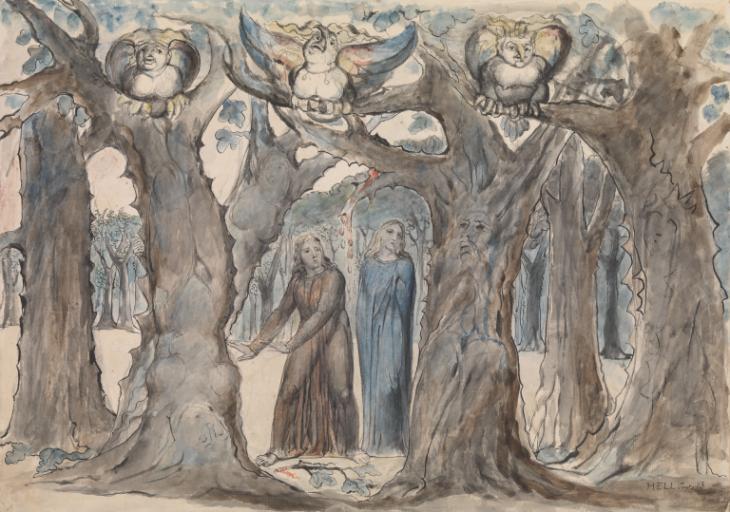
Spiritual Sunday
I’ve been telling you about my Dante discussion group and can report progress on a passage that has long puzzled me. The Wood of the Suicides has one figure who seems so noble and wronged that he doesn’t appear to belong. I now understand why Dante puts him there.
Pier della Vigna was a good and faithful servant to Emperor Frederick II until envious rivals got him arrested for treason and had him tortured. Ultimately he committed suicide, an innocent man driven to desperate measures. Now, as one of the trees in the Wood of Suicides, he pours forth his sorrows once Dante tears off one of his leaves. That’s what it takes for a suicide, lost in the tangled root system of his mind, to open up to someone else:
I am he who held both keys to Frederick's heart, locking, unlocking with so deft a touch that scarce another soul had any part in his most secret thoughts. Through every strife I was so faithful to my glorious office that for it I gave up both sleep and life. That harlot, Envy, who on Caesar's face keeps fixed forever her adulterous stare, the common plague and vice of court and palace, inflamed all minds against me. These inflamed so inflamed him that all my happy honors were changed to mourning. Then, unjustly blamed, my soul, in scorn, and thinking to be free of scorn in death, made me at last, though just, unjust to myself. By the new roots of this tree I swear to you that never in word or spirit did I break faith to my lord and emperor who was so worthy of honor in his merit. If either of you return to the world, speak for me, to vindicate in the memory of men one who lies prostrate from the blows of Envy."
Dante is so overcome with pity that he cannot continue conversing, noting, “such compassion chokes my heart.” I find myself choked up as well and questioning divine justice.
Group member John Reishman, however, reminded us that, in Dante’s system of symbolic retribution, the punishments are self-inflicted. If della Vigna finds himself in the suicides’ dark wood, it’s because he has elevated Frederick II and worldly accomplishments above all other things. In other words, he has forgotten about God.
It’s not that God is punishing him for this. Rather, because della Vigna is focusing on mundane matters instead of on God, he denies himself heavenly solace. When conversing with Dante, he mentions his worldly reputation, not the state of his soul.
John pointed out that Dante is affected in a similar way by lost-in-love Francesca. (I wrote about this last week.) While there is beauty in both Francesca’s and della Vigna’s passions, total immersion leads to loss of spiritual grounding. Della Vigna will feed on his wrongs for the rest of eternity, a self-absorption symbolically captured by Inferno’s harpies, who feast on the suicides’ leaves.
To articulate the heavenly resource that della Vigna ignores, here’s a Denise Levertov poem. Although “days pass when I forget the mystery,” she says, once one remembers, life no longer seems a void.
Primary Wonder Days pass when I forget the mystery. Problems insoluble and problems offering their own ignored solutions jostle for my attention, they crowd its antechamber along with a host of diversions, my courtiers, wearing their colored clothes, cap and bells. And then once more the quiet mystery is present to me, the throng's clamor recedes: the mystery that there is anything, anything at all, let alone cosmos, joy, memory, everything, rather than void: and that, O Lord, Creator, Hallowed One, You still hour by hour sustain it.
In our group discussion, I wondered whether Dante identifies with della Vigna because he too feels politically betrayed. He is lost in a dark wood in part because Florence has banished him under pain of death. Writing the Divine Comedy is a way to reconnect with the divine mystery.

